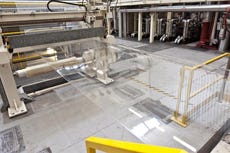Taghleef Industries (Ti; Dubai) has successfully started production of biodegradable biaxially oriented polylactic acid (BoPLA) film at its plant in San Giorgio di Nogaro, Italy. Running NatureWorks's Ingeo PLA, the line is primarily based on Brückner extrusion and winding equipment. Taghleef's European CEO, Valerio Garzitto, said his firm ordered the PLA line in March, with the August 18 startup a more than a month ahead of schedule.
September 9, 2010
Taghleef Industries (Ti; Dubai) has successfully started production of biodegradable biaxially oriented polylactic acid (BoPLA) film at its plant in San Giorgio di Nogaro, Italy. Running NatureWorks's Ingeo PLA, the line is primarily based on Brückner extrusion and winding equipment. Taghleef's European CEO, Valerio Garzitto, said his firm ordered the PLA line in March, with the August 18 startup a more than a month ahead of schedule.
Called Nativia, the BoPLA film will start being shipped in September, targeting fresh produce, baked goods, confectionery, snacks, and dairy/perishable/lidding applications within the food market and labeling and stationery in the non-food market, with metalized grades available. Ti's Frank Ernst, project manager and technical services Europe, told MPW that initial capacity for Nativia will be 4000 tons/yr, noting that while small compared to its production of petroleum-based films, that output covers the needs of the current bioplastic market. Ti declined to discuss whether changes were necessary to its equipment to run the film, saying that information is proprietary.
Taghleef's BoPLA line |
Taghleef's BoPLA line |
When Garzitto initially discussed Ti's BoPLA plans in April, he said the plan was to launch the product range in the fourth quarter, with a film portfolio including different thicknesses and aesthetic features. Nativia is being market as a biodegradable and compostable film that complies with the European composting standard, EN13432. Ti has six production sites across the globe with a nominal production capacity of 260,000 tons/yr. The company's primary offerings are BoPP (biaxially-oriented polypropylene) and CPP (cast polypropylene) films for snacks, confectionery, bakery/cookie, and fresh produce packaging markets, as well as for labeling and adhesive tapes. According to the company's website, the Italian plant runs five BOPP lines, with two metallizers, and annual capacity of 72,000 tons/yr. —[email protected]
About the Author(s)
You May Also Like



